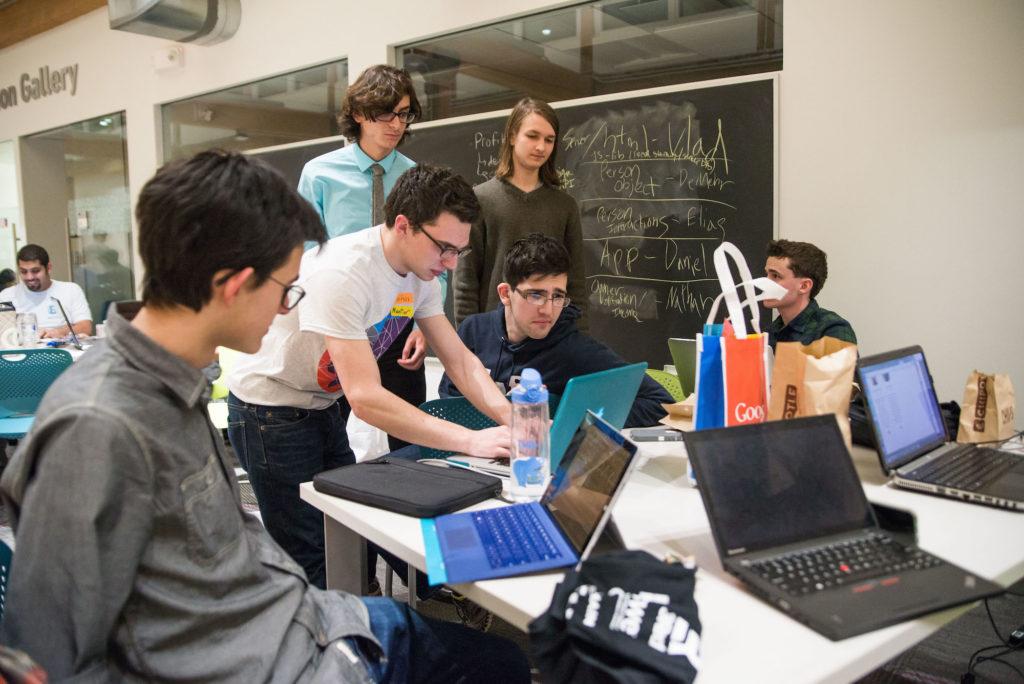By Jasmine Wu, news correspondent
More than 250 programmers, social change activists and nongovernmental organizations (NGOs) teamed up for 24 hours at Tufts University last weekend to create web and mobile applications related to international development and philanthropy.
The fourth-annual IDHack, short for International Development Hackathon, was a collaborative effort by the Massachusetts Institute of Technology Global Poverty Initiative, Harvard Hackers for Development and the Tufts Institute for Global Leadership, putting students in competition to develop online tools for social good. It was held from Friday, Feb. 12 to Saturday, Feb. 13 at the Tufts Collaborative Learning and Innovation Complex.
After networking with companies including Google, Microsoft and JP Morgan Chase, students from universities around Boston gathered to hear pitches from NGOs. The project proposals included digitizing communication between patients and doctors in the Philippines, visualizing energy access in Nicaragua and packaging an hour’s worth of educational video into three megabytes.
“I wouldn’t know how to do any of this myself,” Meghan McCormick, a representative from Dare to Innovate, said. The organization looked to create a mobile accounting platform for its social entrepreneurs in West Africa.
The apps could be used to fill the needs of the organizations, but Raasika Gaugler, co-director of the hackathon, said none of the organizers believed all projects would be a success.
“We’re not expecting to find a cure for world hunger overnight,” Gaugler said. “The point is more to raise awareness that technology can be applied to different fields, like international development, which you often won’t think about.”
Many of the partnering organizations see IDHack as an opportunity to receive innovative, technological solutions from passionate students.
Alyssa Salindong, a representative from Qualcomm, a technology company that sponsored the hackathon, said the app made for communication between doctors and patients was exactly what she was looking for.
“They’re working on finishing the actual app today, so we’ll send that to the Philippines […] and they’ll be able to use it,” she said.
The grand prize of $1,000 was awarded to a group of seniors from the University of Massachusetts-Lowell (UMass Lowell) who created a community portal for Global Health Corps. The website allows users to report and visualize where the densest outbreaks of diseases are and notify Global Health Corps fellows who are within that range.
“It disseminates information about critical events to promote a global response system… with people who can actually push action forward,” Khyteang Lim, a member of the UMass Lowell team, said.
Lim said representatives from Global Health Corps are very interested in what the team had, and he hopes to incorporate what the coders made with what Global Health Corps wants to create an application that serves everyone.
Attendees shared Lim’s desire to make an impact.
Sibonay Koo, a member of a team whose software won Best Design, said she finds value in being forced to “think through the concept because you’re trying to tackle real world problems.” The Tufts students, however, were not able to complete the website they designed to display corruption around the world.
Nathan Foster, a sophomore at Tufts, also said he was worried about the functionality of his final product.
“I’m not sure if we’re expecting them to use our system because it’s kind of tacked together,” he said. “It’s hard to make a product that people are actually going to want to use overnight.”
Foster said that his team felt a bit lost at times without the guidance of the NGOs.
John Williams, a junior at Northeastern University serving as a mentor for the teams, had been up for 30 hours at the time of the closing ceremony. He said that his first time mentoring at a hackathon, although exhausting, was rewarding because he got to “meet and hack with people who are interested in the international development space.”
David Awad, a representative from hackathon partner Major League Hacking, said that hacking isn’t actually about building apps or writing websites.
“It’s about meeting people and making meaningful connections while you have fun,” he said.
Photo by Iaritza Menjivar








![A demonstrator hoists a sign above their head that reads, "We [heart] our international students." Among the posters were some listing international scientists, while other protesters held American flags.](https://huntnewsnu.com/wp-content/uploads/2025/06/image12-1200x800.jpg)
